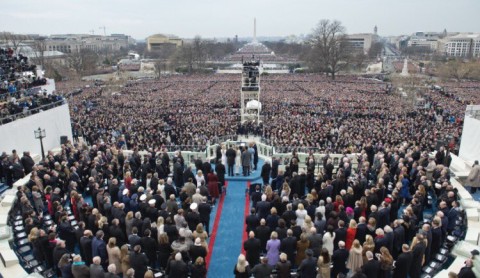
One of the most remarkable elements of President Trump’s inaugural speech was its thorough rejection of the tenets of American civil religion. From George Washington to Barack Obama, presidents have spoken of the United States as having a divinely appointed mission to spread liberty and democratic principles. For example, George W. Bush, in his first inaugural address, said that the nation was answerable to God, “who fills time and eternity with his purpose” and whose purpose is “achieved in our duty” to the country’s ideals. Eight years later, Obama called on the nation to carry forward “the God-given promise that all are equal, all are free, and all deserve a chance to pursue their full measure of happiness.” Since both Bush and Obama believed that the United States aspires to ideals that transcend the nation itself—“ideals that light the world,” in Obama’s phrase—they could invite people around the globe to look to the United States as a partner.
Trump, by contrast, offered no soaring vision of American purpose. He portrayed a world of zero-sum trade-offs in which gains for Americans inevitably mean losses for non-Americans. Rather than appealing to universal principles, the pursuit of which would benefit all people, Trump promised a purely national triumph of prosperity and security: “From now on, it’s America first.”
Theologians have long been wary or dismissive of civil religion, noting that it often functions as a rival religion to authentic faith—it’s a brand of Christian heresy. Civil religion borrows Christian themes but celebrates the stories and martyrs of the nation rather than the church and treats the nation rather than the church as the vehicle of God’s purposes. As such, especially in times of war, American civil religion has been an invitation to hubris and self-righteousness; it can cloak mundane self-interest in religious garb.
Yet because civil religion claims a transcendent purpose for the nation, it has also offered a basis for judging the nation’s failures and spurring it to reform. Because the nation has claimed high ideals for itself, it has invited a moral critique. It was in that tradition that Martin Luther King Jr. blended biblical ethics with democratic principles to condemn racial segregation as a betrayal of the nation’s creed of equality for all. It is in that tradition that protesters took to the streets in recent weeks to insist that the United States fulfill its promise to be a beacon of freedom to refugees from all lands and religions.
Christians have no ultimate stake in the survival of American civil religion. Its demise under Trump could conceivably encourage the church to claim and assert its distinct identity apart from the rhetoric of American politics. Yet insofar as the demise of American civil religion spells the contraction of moral imagination and the loss of a horizon of moral judgment and aspiration, it is hardly a development that Christians can cheer. The collapse of a Christian heresy can lead to things that are far worse.
A version of this article appears in the March 1 print edition under the title “Requiem for civil religion.”




